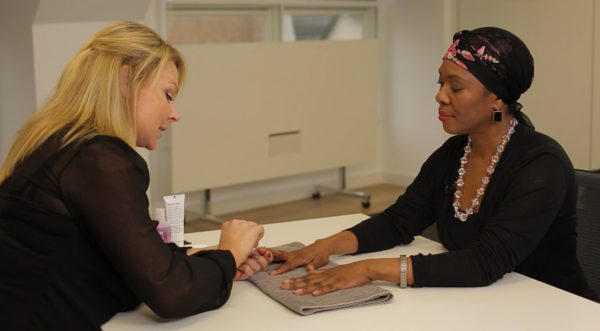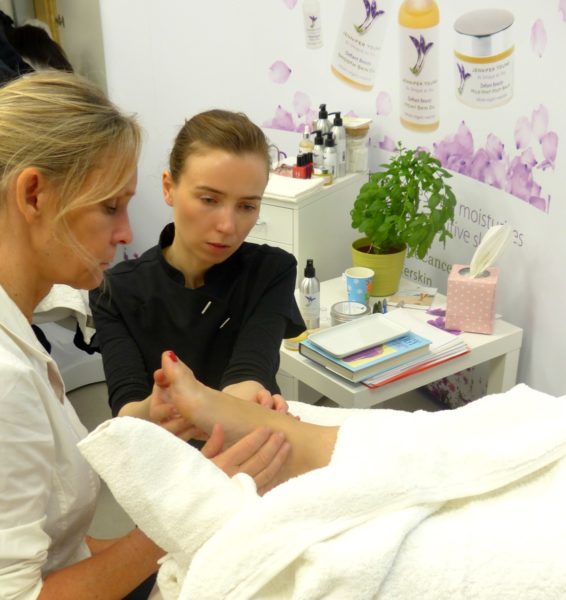
Nails & cancer: Your questions answered
By Scratch Staff | 01 February 2019 | Expert Advice, Feature

While everyone can appreciate the benefits of a pamper, indulging those fighting cancer truly can be a rewarding experience. Here, experts answer your questions about caring for clients with cancer…
What insurance requirements are there?
“Speaking from the perspective of ABT, we offer one of the widest insurance covers available on the market that are designed specifically for the requirements of our membership,” explain a spokesperson from ABT. “We work tirelessly with insurers to remove any nasty small print that you may find elsewhere to offer you what we would consider one of the best packages available to the working therapist, technician or practitioner. Within the ABT package, there are no conditions in the insurance policy wording limiting who someone can or cannot treat. The policy is valid regardless of if the client does, or does not have cancer.
“As with all treatments, it is advisable to check your policy wording, follow your training and if in doubt – seek advice from your membership or insurance provider. With ABT, we are there to assist and guide you within an industry and have the time, experience and contacts to aid clients if in doubt. This is what a membership provider does which we think is of huge value to our clients.”
What medical consent is needed before a treatment?
“With ABT, where is no limitation specifically for cancer sufferers and medical consent it is not required unless there are specific reasons or factors highlighted in consultation or contraindications that have come to light,” says a spokesperson from ABT. “The therapist has been trained in these situations, and that training is the benchmark for these matters. As with any lifestyle adjustment, or change to routine we suggest that medical advice is always a good suggestion. It is always wise to request the client seek advice from their GP before undergoing a course of treatment. If in doubt, get a medical referral and trust your instincts – far too often therapists are bullied into not following procedures by a small percentage of impatient clients!”
How likely is a client to feel pain or discomfort during a treatment?
“It is possible for a client to experience pain or discomfort,” says Jennifer Young, founder of Jennifer Young & Beauty Despite Cancer and The Jennifer Young Training School. “But, pain is more likely to be caused by the condition than the therapy. Therapists should check in with their client during the treatment, reposition them if needed. Before the treatment, encourage the client to tell the therapist if they need anything.”
“Techs needs to be aware that they may see changes in the nails.”
What might I expect to see in the consultation stage?
“Treatments such as chemotherapy or radio therapy can affect the nails, so the tech needs to be aware that they may see changes,” explains Jennie Nippard, nail expert and Look Good Feel Better supporter. “This could mean discolouration, blemishes, nail separation and dryness. The skin can become dry, itchy, sensitive or swollen. Be sure to avoid any harsh or abrasive products which may cause reactions.”
Will I need specialist products or equipment in my kit?
“No,” enthuses Jennifer. “Some clients affected by cancer will prefer natural, specialist products. All will be reassured by their use as it demonstrates an understanding of some of the issues facing many patients.”
How can I avoid any upset or awkwardness?
“Technicians should behave just as they would with any other client – they will be delighted,” implores Jennifer. “I usually recommend that our therapists are led by the client. If they want a ‘cancer conversation’ the client will start it, the therapist should not. Therapists listen rather than offer advice.”
What should I charge?
“If a client is visiting a salon, we don’t want to make them feel conscious of having a treatment or different to other clients,” explains Jennie. “Unless the treatment is being adapted and reduced, I think it’s important to keep the treatment price the same to help the client feel as comfortable as possible.”
What will affect me, as the technician?
“A few of the drugs used in cancer treatment can cause harm to the therapist, as they are excreted through the skin at a very specific interval after a chemotherapy session,” warns Jennifer. “The risk of harm to the therapist is tiny but most therapists like to have the detailed information so that they can make their own decision about the timing of treatments and what information to gather during consultations.”

Read the latest issue












